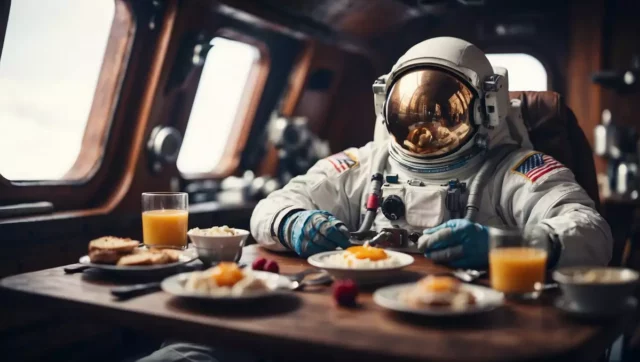### Title: New Research Sheds Light on How Space Affects Our Taste Buds
Have you ever wondered what it’s like to eat in space? Recent findings from Australian scientists reveal that astronauts face surprising changes in their taste perception during missions. Not just because of the microgravity environment, but also due to their unique sensory traits and the stress that comes with isolation. Understanding these shifts is crucial for ensuring the health and comfort of astronauts as we venture further into the cosmos.
#### The Taste Dilemma: Why Eating in Space Matters
One of the biggest challenges for astronauts is maintaining their caloric intake during missions. If food doesn’t taste good, it can be tough for them to eat enough. Imagine being stuck in a confined space and finding your favorite meal completely unappetizing! While sauces and condiments might help spice things up, they can also lead to allergies—something that’s particularly concerning for long-duration missions to places like the Moon or Mars.
#### Unexpected Reactions to Food and Flavor
Each astronaut reacts differently to changes in taste. For some, a beloved dish might suddenly taste awful, while others might find that new flavor sensations emerge. This variability is fascinating! For instance, consider an astronaut who typically enjoys a sweet strawberry shake but finds it overly bland and unappealing in space. How do they cope?
Data from years of space exploration show that many astronauts report altered taste experiences. A study found that certain familiar foods, when consumed in space, were perceived as less flavorful, sparking curiosity and further investigation into these phenomena.
#### Unpacking the Science: What Causes These Changes?
Researchers have identified two main reasons for altered taste perception in space:
1. **Fluid Redistribution**: In microgravity, fluids in the body shift, which can impact taste sensitivity.
2. **Food Storage and Preparation Conditions**: The way food is stored and prepared in space can dramatically affect its flavor.
However, these factors alone don’t fully explain the complexity of how astronauts perceive taste.
#### Exploring Taste Perception Under Stress
A team from the Royal Melbourne Institute of Technology took a closer look at these changes by simulating the International Space Station (ISS) environment using virtual reality. In this experiment, participants evaluated the intensity of various smells in both a neutral lab setting and within the virtual ISS replica. The results were striking: participants reported that aromas like almond and vanilla became more intense in the virtual environment, while citrus scents remained fairly stable. This suggests that stress and isolation might heighten sensitivity to specific smells.
#### The Future of Taste in Space Exploration
These findings could lead to exciting new research opportunities. For instance, the heightened sensitivity to aromas like vanilla and almond could help scientists understand how astronauts’ culinary preferences shift under stress. This insight could pave the way for improved dietary strategies for space missions.
Here are some potential applications of this research:
— **Tailored Meal Plans**: Developing meals that account for altered taste perceptions might encourage astronauts to eat healthier.
— **Flavor Enhancement Techniques**: Finding ways to enhance food flavors in space could improve the overall dining experience.
— **Emotional Support Through Food**: Recognizing the emotional connections to food could help astronauts cope with stress during missions.
In conclusion, as we look ahead to future missions beyond Earth, understanding how taste perception changes in space becomes not just a matter of curiosity but a critical component of astronaut health and mission success. Who knows? Perhaps the next generation of astronauts will enjoy a virtual fine dining experience while floating in the vastness of space. Let’s hope they’ll find their favorite flavors, even when they’re light-years away from home!





